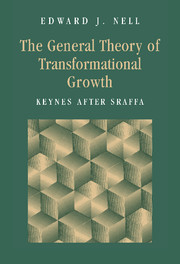Book contents
- Frontmatter
- Contents
- Preface
- Acknowledgments
- Part I History or equilibrium?
- Part II Method and approach: the active mind
- 3 Conceptual truths and empirical observations
- 4 Rationality, structure, and behavior
- Part III Money and the Golden Rule
- PART IV The wage-profit trade-off
- Part V Investment and Mass Production
- Part VI Money and fluctuations in the modern economy
- Conclusions
- Bibliography
- Index
4 - Rationality, structure, and behavior
Published online by Cambridge University Press: 21 January 2010
- Frontmatter
- Contents
- Preface
- Acknowledgments
- Part I History or equilibrium?
- Part II Method and approach: the active mind
- 3 Conceptual truths and empirical observations
- 4 Rationality, structure, and behavior
- Part III Money and the Golden Rule
- PART IV The wage-profit trade-off
- Part V Investment and Mass Production
- Part VI Money and fluctuations in the modern economy
- Conclusions
- Bibliography
- Index
Summary
Behavior takes place in a social context, some elements of which will be transitory, others permanent. Regular or repeated behavior will depend chiefly on the latter. But such permanent features of the social setting must themselves be reproduced physically, if material, or must be reproduced in the actions and behavior of agents, if, like rules and customs, they are intangible. This suggests that inquiry must proceed along two related fronts, delving into institutions and into technology. But it also calls for two different kinds of fieldwork, one exploring structure, the enduring features of the social context, whether material or institutional, the other looking into behavior itself, whether reflecting institutional imperatives or individual choice.
Fieldwork
On the one hand, then, there is the investigation of institutions and normal practices, as they relate to economic questions – family and kinship on the one side, jobs, offices and the workplace on the other, and the market in between. In each case the aim will be to clearly identify the relevant roles, duties, social conventions, jobs, and offices. On the other hand, fieldwork will be needed to uncover the true motivations, beliefs, expectations, and subjective intentions of those currently occupying roles, jobs, and offices, carrying out duties, and (supposedly) observing conventions.
- Type
- Chapter
- Information
- The General Theory of Transformational GrowthKeynes after Sraffa, pp. 106 - 148Publisher: Cambridge University PressPrint publication year: 1998



